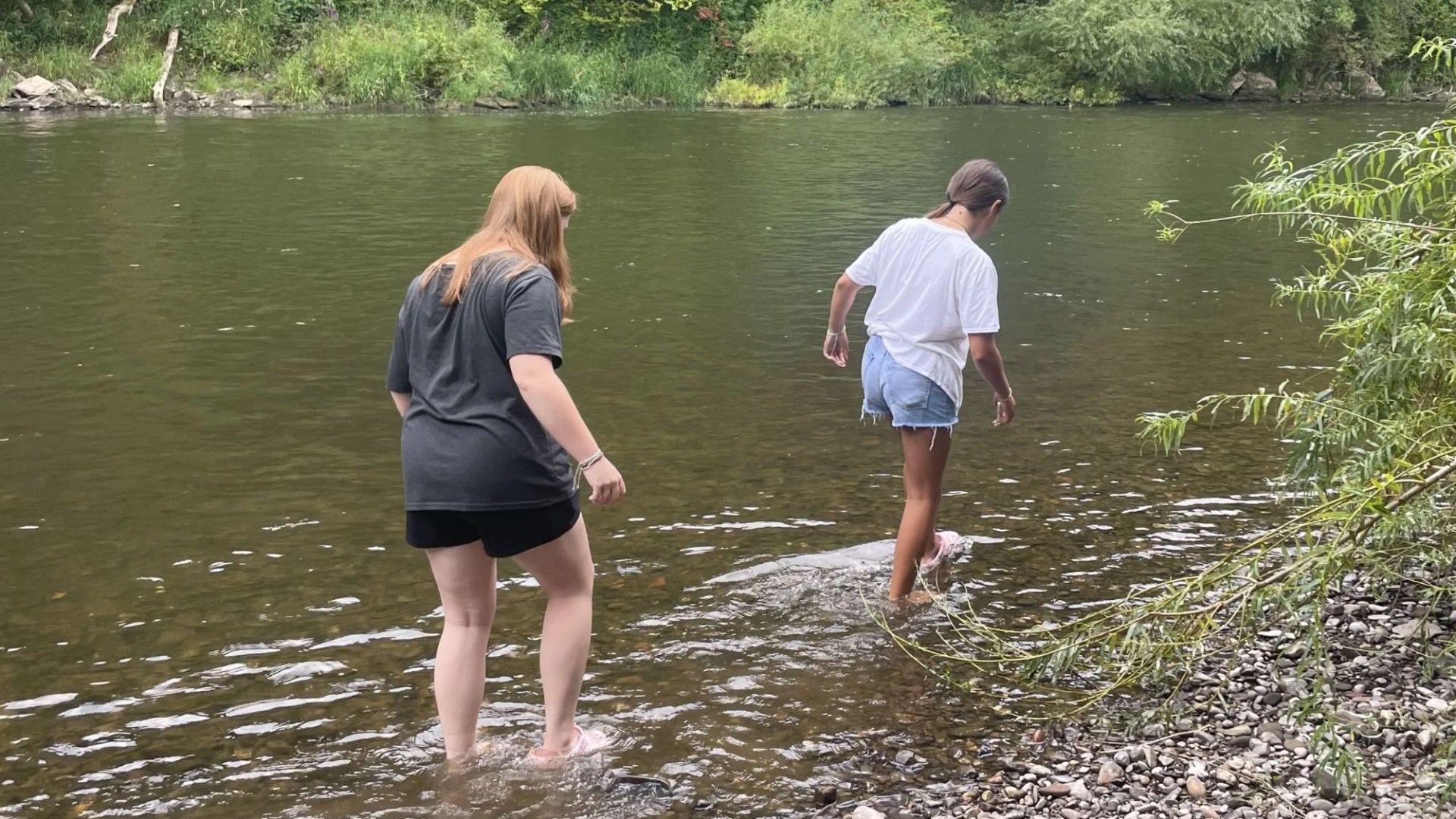A TEENAGE girl was allegedly left unable to breathe and “violently” sick after swimming at a popular UK beauty spot.
Lindsey Hall says her daughter Amelia Deakin-Hall couldn’t eat or even keep water down following a dip in the River Severn earlier this month.

8

8
The 13-year-old had enjoyed a 2.1mile (3.4km) walk around Trimpley Reservoir in Bewdley, Worcestershire, on August 11 with Lindsey, a friend and her mum.
The weather was warm, and the group headed to the nearby “clear-looking” river to cool off.
While the mums only paddled up to their knees, the teens were “being silly”, doing dives and falling backwards, accidentally swallowing some water in the process.
Just 36 hours later, Amelia allegedly started suffering from agonising stomach cramps, was struggling to breathe properly, and began projectile vomiting.
Lindsey, a civil servant, called 111. An ambulance was dispatched, a GP appointment was made, and Amelia was given anti-sickness medication.
The 45-year-old reported the incident to the Environment Agency and was allegedly told that because that stretch of river is an “undesignated bathing spot”, no water quality testing is required by law.
Amelia has since recovered, but Lindsey is urging people not to paddle or swim at unofficial sites to avoid experiencing the same ordeal.
The mum, from Kidderminster, said: “We did a really nice walk all around Trimpley Reservoir [and then went to the river].
“There’s an area that’s stoned over, almost like a little beach, and there’s a rope swing.
“The canoes stop there for lunch, it’s a known paddling area, so it’s not unusual for people to be in the water, and there were three other large groups while we were there in the water too.
“The water looked clear, there was no smell and fish were swimming. It just looked like a lovely little natural spot that was fine.
“I went in, only up to my knees, but the girls were messing about and going under the water as well.
“They were up to their waists but doing little dives in, falling backwards and being silly – just enjoying themselves.
“Amelia felt fine there, no sign of anything, then 36 hours later she was ill.”
‘RELENTLESS SPEWING’
Amelia’s friend had also reportedly been sick through the night, so Lindsey was convinced the river was to blame.
“I came back from work, I’d been on a night shift, and was about to get into bed when she started spewing,” the mum added.
“It was violent projectile vomiting. She couldn’t breathe. It was horrific and relentless.
“We’d not eaten anything differently, we’d all eaten the same thing for tea.
“Both of them swallowed river water. If it had been a tummy bug, I would have been sick.”
It’s been horrible. Please take my advice
Lindsey Hall
The 111 call handler sent an ambulance to their house and paramedics checked Amelia’s condition.
“She was still being sick and couldn’t even keep any water down after four hours so was given anti-sickness tablets,” Lindsey added.
After Googling the location and “being sick after going in a river”, she spotted an alarming news story.
It warned that anyone who had fallen ill after swimming in rivers should seek medical help.
Lindsey said she then grew concerned that faecal matter from nearby sewage treatment works could have made the girls poorly.
Severn Trent Water has denied there is any sewage in the area.

8

8
“There’s a sewage outlet upstream so the water could be flowing down to where we were,” Lindsey said.
“I just think it’s shocking that raw sewage can be pumped into rivers full stop.
“I’m really gobsmacked about it, it doesn’t seem right. It’s put Amelia off paddling in future.
“It’s been horrible watching her be so ill, but they’re both OK now.
“We go to the seaside, we have paddleboards and we bodyboard – we quite like water sports.
“They do kayaking down there and we were talking about booking that and how nice it would be, but there’s no chance we’ll be doing that now.
“My advice would be not to go into any areas that aren’t designated bathing spots.
“I didn’t even know they were a thing before this happened.”
Signs you’re swimming in sewage
STUART Davies, Surfers Against Sewage regional rep for Brighton, said bathers should never assume the water will be clean.
He said key signs to look out for are “debris”, “floaters” and “an exceptional stink”.
Once surrounded by dirty water, swimmers should “get yourself out” and “keep your mouth shut”, he said.
Appearing on ITV Tonight’s Britain’s Dirty Water: What Went Wrong?, he added: “If you are actually out there when a sewage spill goes out, you’ll first notice debris, you’ll notice floaters.
“And then there’ll be an exceptional stink. And you know, you suddenly realise that you’re in the middle of a sea of sewage.
“It’s disgusting and you’re also concerned for your health.”
Local water firm Southern Water, which serves 700 miles of coastline, discharged sewage into rivers and seas for more than 146,000 hours in 2022.
Stuart added: “Can you see if there’s a slick on the water? Generally if it’s brown, it’s gonna be algae.
“If it’s grey, it’s probably sewage. And then does it smell? You can smell sewage.
“Any of those scenarios don’t go in or get yourself out. And it’s also a good idea to keep your mouth shut.”
Water companies are sometimes allowed to spill sewage into open water following heavy rainfall to prevent systems becoming overloaded and flooding back up into homes.
This is known as “storm overflows” and campaigners say that it is happening far too often.
The Water Services Regulation Authority, Ofwat, warns that storm overflows cause environmental damage and make it more difficult for people to enjoy rivers and beaches.
The UK has more than 600 designated bathing waters – sites that are popular for swimming and paddling.
These are the only places where bacteria levels are monitored. This usually comes from sewage and animal manure.
Bathing waters are categorised as ‘excellent’, ‘good’, ‘sufficient’ or ‘poor’.
Signs advising against bathing should be displayed at any sites rated as ‘poor’.
This doesn’t mean you can’t swim, but there might be an increased risk of getting ill, according to The Outdoor Swimming Society.

8

8

8

8
Chris Whitty, the government’s chief medical adviser, warned in May that swimming in rivers could make people sick, even when water treatment plants are working properly.
He said they sometimes still pump harmful bacteria out, but fixing the problem should be a “major” public health priority.
An Environment Agency spokesperson said: “Many popular swimming spots are designated as bathing waters, meaning they are monitored and protected from sources of pollution known to be a risk to human health.
“The River Severn near Trimpley Reservoir is not a designated bathing water.
“If members of the public decide to swim in a river which is not a designated bathing site, our ‘swim healthy’ advice is available online.”
This warns that open water swimming “can increase the risk of gastrointestinal illnesses, or stomach bugs, which may cause diarrhoea and/or vomiting, as well as respiratory, skin, ear and eye infections”.
“Most symptoms of these illnesses caused by micro-organisms such as norovirus, giardia and cryptosporidium, will generally be mild, however, there is also a risk of more severe infections caused by micro-organisms such as E. coli O157, which may cause severe gastrointestinal illness and leptospirosis (Weil’s disease), which can cause liver and kidney problems,” it adds.
The Environment Agency said that bacteria in rivers can originate from a range of different sources, including sewage effluent, but also livestock, urban drainage, birds, wildlife and pets.
Rivers and other open water locations that are not designated bathing sites are managed for the purpose of protecting fish and wildlife, not people, so the health risks from using these locations may be higher than at designated bathing waters, the spokesperson said.
A Severn Trent Water spokesperson said: “Many factors make up the health of a river such as industry and agriculture, and any concerns about a particular stretch should be reported to us and the Environment Agency so the correct investigations can be carried out.
“We have investigated this and we can confirm it isn’t in any way connected to Severn Trent.
“Our operations are working as they should and we don’t have a storm overflow in the area.”
Health risks of swimming in open water
ANYONE can become unwell from swimming in any open water as there will always be micro-organisms present.
The risk of becoming ill depends on various factors:
- Children and novice swimmers are more likely to swallow water accidentally
- Those with an impaired immune system are more susceptible to infection
- Those swimming in rivers and estuaries are more likely to become unwell
- Heavy rainfall can wash harmful bacteria from agricultural land, urban areas and sewage to rivers, seas and bathing waters and affect water quality
Always check the most up-to-date water quality information online first.
Source: UK Health Security Agency




